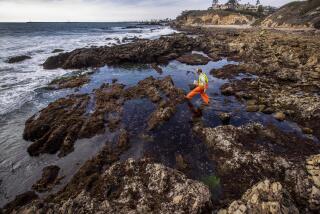Judge rejects Navy request for sonar training exemption
A federal judge in Los Angeles on Monday rejected the Bush administration’s attempt to exempt Navy sonar training from key environmental laws, ruling that there’s no real emergency to justify overruling court-ordered protections for whales and dolphins.
U.S. District Judge Florence-Marie Cooper also suggested that President Bush’s effort to maneuver around an earlier federal court order was “constitutionally suspect,” although she made no ruling on that issue.
The 36-page order issued late Monday means the Navy will have to follow Cooper’s previous injunction forbidding the use of powerful submarine-detecting sonar in areas where whales are abundant, such as within 12 nautical miles of the coast and in the waters between Santa Catalina and San Clemente islands.
That January order also will require the Navy to shut down sonar when whales or other marine mammals are spotted within 2,200 yards of vessels or under certain sea conditions that allow the powerful sonic blasts to travel farther than usual. This type of sonar has been linked to panicked behavior and mass deaths of whales in the Bahamas, the Canary Islands and elsewhere, although never off Southern California.
“We are aware of the ruling and reviewing it,” said Capt. Jeff Davis, a Navy spokesman at the Pentagon. He declined to comment further, including whether the Navy will appeal.
Peter Douglas, executive director of the California Coastal Commission, said the federal courts have backed up the commission’s assertion that the Navy can implement needed safeguards for marine mammals without compromising its upcoming training missions.
“I don’t know what it’s going to take for the Navy to get it,” Douglas said. “The courts have said over and over that the Navy must follow the law.”
The Navy’s 3rd Fleet, based in San Diego, last week concluded training exercises designed to certify the USS Abraham Lincoln and its compliment of ships as combat-ready before the strike group is dispatched to the Persian Gulf in March.
The Navy maintains that the lives of its sailors depend on being properly trained to detect vessel operated by China, Iran, North Korea and other potentially hostile nations.
Last month, Bush and the White House Council on Environmental Quality sought to exempt these training exercises in Southern California waters, saying they were a matter of national security and that exempting the exercises from environmental laws was in the “paramount interest” of the United States. To get around one law, the National Environmental Policy Act, the White House approved “alternative arrangements” for the Navy because it said “emergency circumstances” prevented normal compliance with the law.
After reviewing the law and regulations, Cooper concluded that the Navy had no real emergency on its hands. The move to invoke these alternative arrangements, she wrote, appeared to be an attempt to get around the law after more than 10 months of litigation and losing several court battles.”The Navy’s current ‘emergency’ is simply a creature of its own making, i.e., its failure to prepare adequate environmental documentation in a timely fashion,” Cooper wrote.
Joel Reynolds, a senior attorney with the Natural Resources Defense Council, applauded the ruling.
“It properly rejected the president’s attempted end run around the will of Congress and an order of the federal court,” said Reynolds, who represents a consortium of conservation groups that brought the original court challenge. “The court confirms that we don’t have an imperial presidency in this country.”






